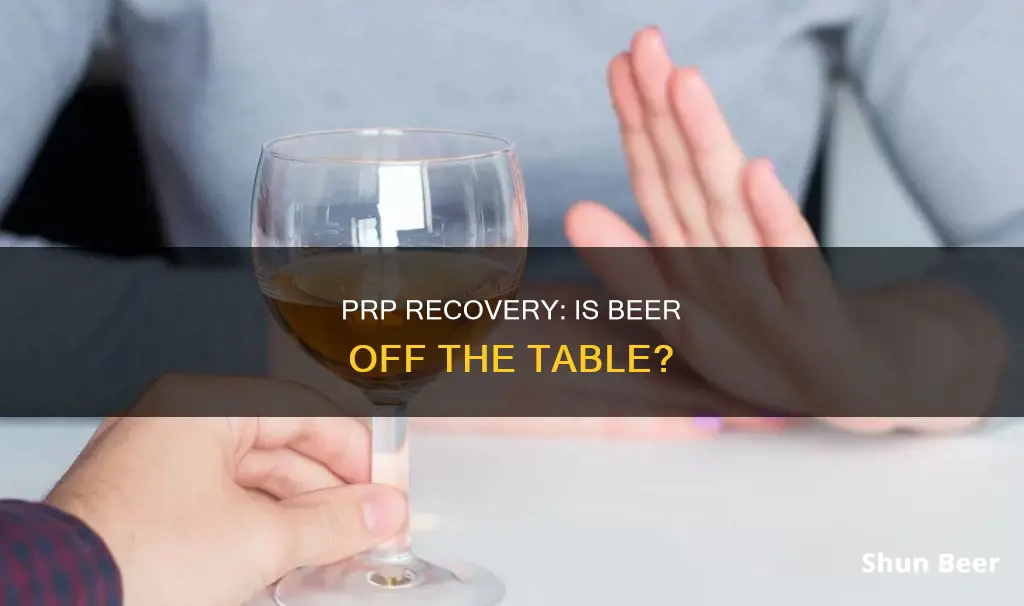
Drinking alcohol is a common way to celebrate or relax, but it's important to be mindful of how it can affect your health, especially when mixed with other substances or medications. Beer, a popular alcoholic beverage, contains alcohol that can have negative interactions with certain medications and health conditions. In this article, we will explore the topic of drinking beer after undergoing PRP (Platelet-Rich Plasma) treatment, considering the potential risks and recommendations for a safe recovery. PRP treatment is often used to accelerate healing and regenerate tissues, but it's crucial to understand the impact of alcohol on the body's recovery process.
| Characteristics | Values |
|---|---|
| Alcohol's effect on platelet function | Alcohol decreases platelet activation and aggregation and response to other proteins and enzymes |
| Alcohol's effect on stem cell function | Alcohol affects stem cell numbers and function |
| Alcohol's effect on blood | Alcohol is a blood thinner |
| Alcohol's effect on bruising and inflammation | Alcohol can worsen bruising and inflammation |
| Alcohol's effect on the body's healing process | Alcohol can affect the body's natural healing process |
| Alcohol's dehydrating effect | Alcohol is a diuretic |
| Alcohol's effect on fatigue | Alcohol can cause fatigue |
| Recommended alcohol abstinence period before PRP therapy | At least a week |
| Recommended alcohol abstinence period after PRP therapy | 3 to 7 days |
What You'll Learn

Alcohol can affect platelet function
Secondly, alcohol acts as a vasodilator, increasing blood flow and widening blood vessels in the treated area. This can lead to increased bruising and inflammation, as more blood leaks out of the vessels. As a result, the recovery period after PRP injections may be extended.
Thirdly, alcohol consumption can cause dehydration. As a diuretic, alcohol causes fluids to pass quickly through the renal system, leading to fluid loss and potential tissue and cell damage. Dehydration can also prolong the recovery process and disrupt the body's natural healing abilities.
Additionally, excessive alcohol consumption is associated with long-term health effects, including weakening of the immune system and platelet function over time. It can also contribute to thinning hair, inflammation, and poor joint health.
To ensure optimal results and a smooth recovery from PRP treatment, it is recommended to avoid heavy drinking for at least a week before and after the procedure. Patients should also be aware of other aftercare instructions, such as refraining from anti-inflammatory medications and herbal supplements, and increasing water intake to stay hydrated.
Stone Cold Steve Austin's Beer of Choice
You may want to see also

It can decrease the healing function of the platelets
Drinking alcohol after a PRP injection is not recommended, as it can negatively impact the treatment's effectiveness. Alcohol is a known blood thinner and can impair the function of platelets, which are crucial for the body's healing process. Here are four to six paragraphs explaining how alcohol can decrease the healing function of platelets in the context of PRP treatment:
Platelets play a vital role in the body's healing process by promoting blood clotting and providing various growth factors essential for tissue repair, new cell growth, and collagen production. However, alcohol consumption can negatively impact both platelet count and function during PRP treatment. When platelet function is impaired, the PRP injections may not deliver their maximum healing abilities, potentially resulting in suboptimal outcomes for conditions like hair loss or pain management.
Alcohol, as a blood thinner, can also worsen bruising and inflammation. As a vasodilator, alcohol widens blood vessels and increases blood circulation in the treatment area, making patients more susceptible to bruising. This can prolong the healing process and increase the recovery period, as more bruising leads to more time needed for the body to heal.
Additionally, alcohol consumption can promote dehydration, as it is a diuretic that causes fluids to pass quickly through the renal system. Dehydration can lead to further cell and tissue damage and increase fatigue, which can also extend the recovery period and disrupt the body's natural healing process.
The effectiveness of PRP treatment relies on the body's ability to heal itself, and alcohol consumption can hinder this process. To achieve optimal results and a smooth recovery, patients are advised to avoid heavy drinking for at least a week before and after PRP therapy. This allows the body to maximize its healing capabilities and ensures the best possible outcome from the treatment.
Moreover, alcohol can negatively impact stem cell numbers and function, which may further compromise the healing process. By impairing platelet activation and aggregation, alcohol can hinder the body's ability to repair and regenerate tissue. Therefore, it is crucial to commit to a healthy lifestyle, including a good diet, adequate sleep, and abstaining from alcohol, to maximize the healing potential of PRP treatment.
Mega Sizes and Beer: A Perfect Pairing?
You may want to see also

It can prolong bruising and inflammation
Drinking alcohol after a PRP injection is not recommended as it can prolong bruising and inflammation. Alcohol is a vasodilator, which means it widens the blood vessels and increases blood flow to the treated area. This can lead to increased bruising and inflammation as more blood leaks out of the vessels.
The effects of alcohol on bruising and inflammation can prolong the recovery period after PRP injections. It is therefore advisable to avoid heavy drinking for at least a week before and after PRP therapy. This will help to ensure optimal results and a smooth recovery.
In addition to prolonging bruising and inflammation, alcohol can also negatively impact the effectiveness of PRP treatment by impairing platelet function and reducing the healing ability of the platelets. Platelets play a vital role in the body's healing process by promoting blood clotting and providing growth factors essential for restoring damaged tissue. Higher alcohol levels can cause a reduction in platelet function and count during PRP treatment, compromising the results.
Furthermore, alcohol consumption can promote dehydration, which can cause additional tissue and cell damage. It is important to stay hydrated after a PRP injection, but alcohol is a diuretic and can lead to dehydration. This can result in fatigue and prolong the recovery period, disrupting the body's natural healing process.
While there is no downtime after PRP treatment, patients are advised to take it easy for a few days following the procedure. This includes avoiding excessive alcohol consumption for at least 3 to 7 days after the injections. Once most side effects have subsided, patients can resume drinking alcohol in moderation. However, it is important to note that long-term alcohol consumption can lead to chronic health problems and weaken the immune system and platelet function.
Beer and Noom: What's the Verdict?
You may want to see also

It promotes dehydration
Drinking alcohol after a PRP injection is not recommended as it can cause dehydration. While alcohol may temporarily quench your thirst, it is a diuretic, which means it can cause fluids to pass quickly through the renal system. Dehydration may cause more cell and tissue damage, and you may feel more fatigued, which can extend your recovery period and disrupt your body's natural healing process.
It is necessary to stay hydrated after a PRP injection, but it is best to avoid alcohol. Dehydration caused by alcohol consumption can lead to increased bruising and inflammation, as it can widen the blood vessels and increase blood circulation in the treatment area. This can result in a longer recovery period.
In addition, alcohol can affect the platelet function, which is crucial for the effectiveness of PRP treatment. Platelets play a vital role in the body's healing process by promoting blood clotting and providing growth factors essential for restoring damaged tissue, growing new cells, and stimulating collagen production. However, increased alcohol levels can decrease platelet count and function, reducing the healing abilities of PRP injections.
To ensure a smooth recovery, it is recommended to increase water intake and avoid alcohol consumption for at least 3 to 7 days after the PRP injections.
The Magic Behind Beer Ripples: How Does It Work?
You may want to see also

It can negatively impact results
Drinking alcohol after a PRP injection can negatively impact the results of the treatment. Here are some reasons why:
Impaired Platelet Function
Alcohol consumption can decrease platelet activation and aggregation and impair their response to proteins and enzymes. Platelets are crucial in the body's healing process as they promote blood clotting and provide growth factors essential for restoring damaged tissue, growing new cells, and stimulating collagen production. By impairing platelet function, alcohol can compromise the effectiveness of PRP injections, leading to suboptimal results.
Prolonged Bruising and Inflammation
Alcohol acts as a vasodilator, increasing blood flow and widening blood vessels in the treated area. This can make patients more susceptible to bruising and inflammation, both before and after the procedure. Increased bruising may prolong the recovery period, as it indicates more blood leaking out of the vessels.
Dehydration
While alcohol may temporarily quench thirst, it is a diuretic, causing fluids to pass quickly through the renal system. Dehydration can lead to additional cell and tissue damage and increase fatigue, thereby extending the recovery period and disrupting the body's natural healing process. After a PRP injection, it is essential to stay hydrated to support the body's healing process.
Compromised Overall Health
Excessive alcohol consumption is known to have long-term effects on overall health. It can weaken the immune system and platelet function over time, making individuals more susceptible to chronic health problems. Additionally, alcohol can worsen thinning hair and promote inflammation, negatively impacting joint health. Therefore, it is crucial to consume alcohol in moderation or abstain altogether to support overall health and the effectiveness of PRP treatment.
Vaccine and Beer: What's Safe to Drink?
You may want to see also







